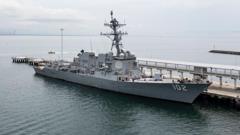Did Trump Just Declare Victory Over Drug Smugglers with Recent Airstrike?

Published: 2025-09-04 11:05:36 | Category: News
The Tren de Aragua gang, originating from Venezuela, has been a subject of controversy and concern due to its alleged criminal activities, including potential ties to drug trafficking. Despite claims of limited involvement in cocaine smuggling, recent developments indicate increasing scrutiny of this gang by the US and a heightened military response from the Venezuelan government. This article explores the implications of these developments and the broader context of drug trafficking in the region.
Last updated: 21 October 2023 (BST)
Understanding the Tren de Aragua Gang
The Tren de Aragua gang is a criminal organisation that has garnered attention due to its alleged involvement in various illicit activities across Latin America. Although the gang has denied having a substantial presence beyond Venezuela, evidence suggests otherwise. Key points about the gang include:
- Originated in Venezuela, with roots in the Aragua state.
- Involved in various criminal enterprises, including extortion and robbery.
- Reportedly expanding operations into other Latin American countries.
Recent Developments and US Response
In a recent report published by InSight Crime, researchers assert that the Tren de Aragua gang is not significantly involved in large-scale cocaine smuggling, a claim that contrasts with the US government's stance. In response to perceived threats from drug cartels in the region, the US has announced plans to strengthen its maritime force in the waters off Venezuela. This move aims to deter drug trafficking operations, which have been on the rise in Latin America.
The US Military Strategy
The US strategy involves increasing naval presence in the Caribbean and surrounding waters, focusing on surveillance and interdiction of drug shipments. This initiative reflects growing concerns regarding the influence of organised crime in the region, particularly as drug trafficking routes evolve and adapt to law enforcement efforts.
Venezuela's Military Response
In reaction to US plans, Venezuela’s government, led by President Nicolás Maduro, has mobilised troops along its coastal borders and the frontier with Colombia. This military deployment aims to reinforce national security and assert Venezuela's sovereignty in the face of external military pressure. Moreover, the government has called on citizens to enlist in a civilian militia, emphasising a united front against foreign intervention.
The Broader Context of Drug Trafficking
The situation surrounding the Tren de Aragua gang and the US military response must be understood within the larger context of drug trafficking in Latin America. Several factors contribute to the complexity of this issue:
- Geographical Factors: Venezuela's location makes it a strategic point for drug trafficking routes.
- Political Instability: Ongoing political issues in Venezuela create a power vacuum that criminal organisations exploit.
- International Cooperation: The need for collaboration among countries to combat drug trafficking effectively.
Impact on Local Communities
The activities of gangs like Tren de Aragua have significant ramifications for local communities. Residents often live in fear due to gang violence and extortion. Moreover, the militarisation of society can lead to human rights abuses and further instability. The dual challenge of combating crime and protecting citizens is a delicate balance for the Venezuelan government.
Community Responses
In light of the threats posed by organised crime, local communities are taking various measures to protect themselves, including community watch groups and grassroots initiatives aimed at fostering safety. However, these efforts often face challenges due to the pervasive influence of criminal organisations.
Future Implications
The ongoing conflict between the Tren de Aragua gang, the US military response, and the Venezuelan government's actions raises several questions about the future landscape of drug trafficking in the region. Key considerations include:
- Will increased military presence deter drug trafficking or exacerbate violence?
- How will the Venezuelan government manage the dual pressures of external military threats and internal gang violence?
- What role will international cooperation play in addressing these complex issues?
Potential Outcomes
As the situation unfolds, the potential for escalated conflict remains high. The interplay between military responses and gang operations could lead to increased violence, further complicating efforts to stabilise the region. Understanding these dynamics is critical for policymakers and community leaders alike.
Conclusion: What Lies Ahead?
The Tren de Aragua gang's situation encapsulates the broader challenges of drug trafficking and organised crime in Latin America. As external pressures mount and internal conflicts continue, both the Venezuelan government and international actors must navigate a complex landscape. The outcomes of these developments will significantly impact the future of the region and its inhabitants.
FAQs
What is the Tren de Aragua gang?
The Tren de Aragua gang is a criminal organisation from Venezuela, primarily involved in various illegal activities such as extortion and robbery, with claims of expanding into other countries.
How has the US responded to the gang's activities?
The US has announced plans to increase its naval presence in the waters off Venezuela to combat drug trafficking, viewing the gang as a potential threat.
What measures has the Venezuelan government taken?
The Venezuelan government has deployed troops along its borders and urged citizens to join a civilian militia in response to US military actions and gang violence.
What impact does drug trafficking have on local communities?
Drug trafficking contributes to violence and instability in local communities, leading to fear and economic challenges for residents.
What are the potential future implications of this situation?
The ongoing conflict may lead to increased violence and complicate efforts for stability, with significant consequences for the region's residents.



